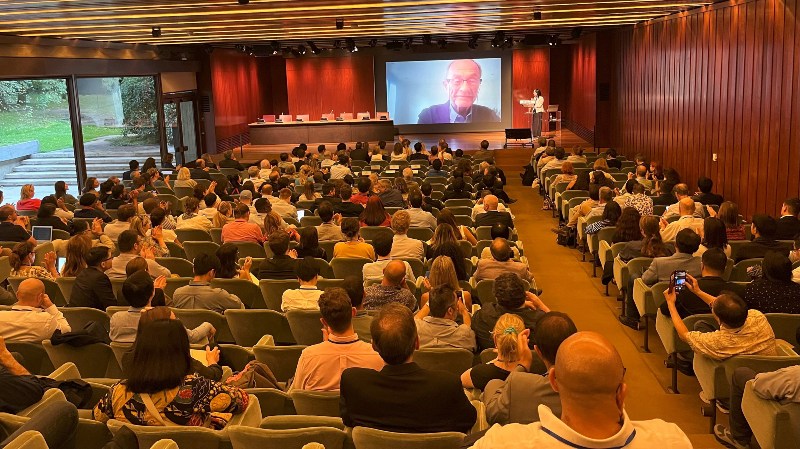

Day 1 at IPSA’s 75th Anniversary Conference on Democratization and Autocratization in Lisbon
Publication date: Mon, 09 Sep 2024
Adam Przeworski delivers the Keynote Address at the Democratization and Autocratization Conference in Lisbon on 11 September 2024.
IPSA’s 75th anniversary conference on Democratization and Autocratization kicked off at the Gulbenkian Foundation and NOVA University in Lisbon, Portugal, on 11 September. The conference was presented with support from the Gulbenkian Foundation and in partnership with the Portuguese Political Science Association (APCP). Also sponsoring the event were the Konrad Adenauer Foundation Spain/Portugal Office, Turismo de Lisboa, and the Luso-American Development Foundation. Finally, Brill, Verlag Barbara Budrich, Cogitatio Press, and Frontiers in Political Science were present as exhibitors. We extend our heartfelt appreciation to our conference partners, supporters, sponsors and exhibitors for their invaluable contributions to this international event.
Opening Remarks
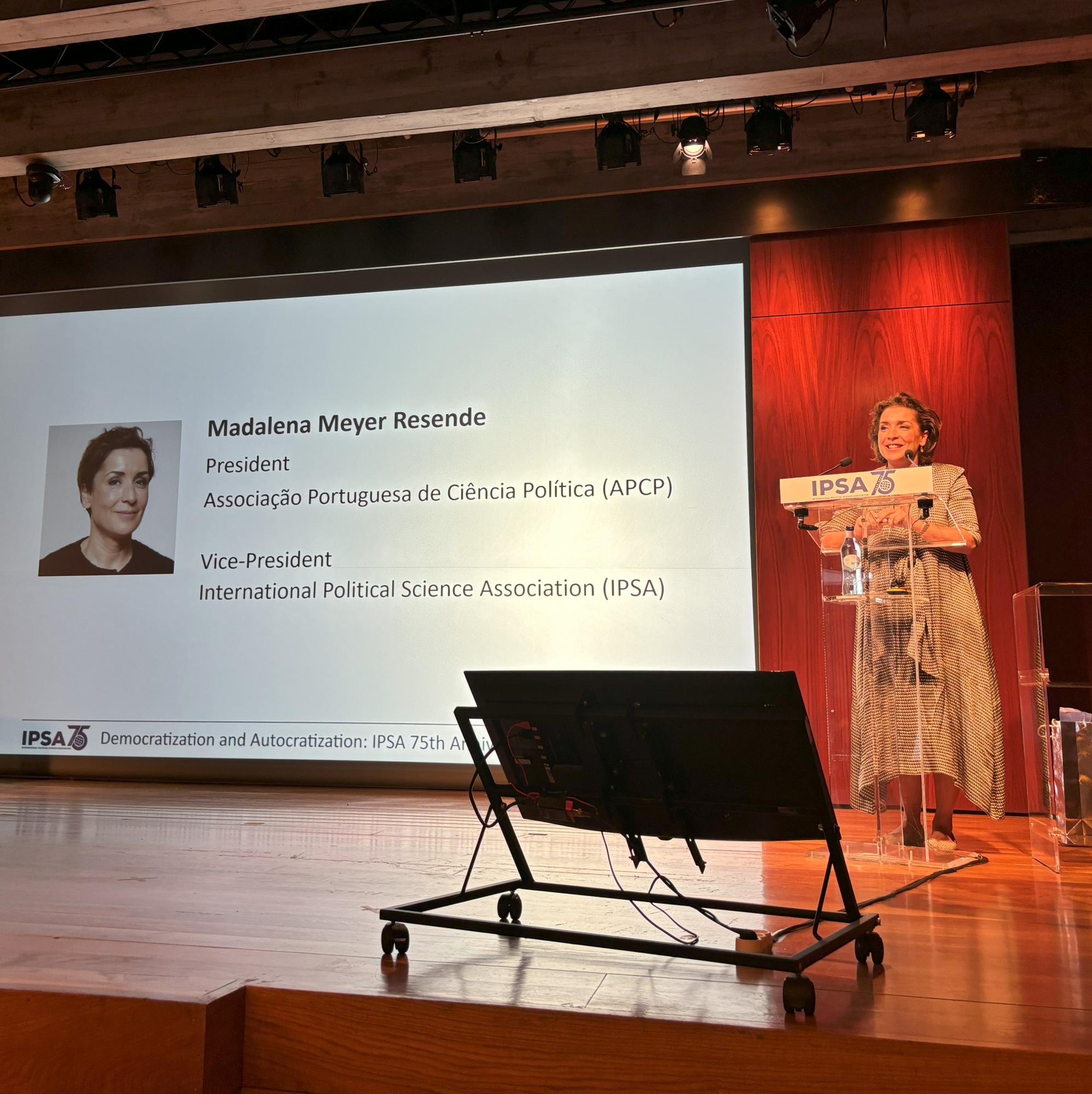 Madalena Meyer Resende, President of the Portuguese Political Science Association (ACPC) and Head of the Local Organizing Committee (LOC) for the 75th Anniversary Conference opened the conference by welcoming the participants to Lisbon. In her address, she expressed how pleased she was to finally welcome IPSA members to a conference in Lisbon, following the cancellation of the 2020 IPSA World Congress due to the COVID-19 pandemic. She reflected on the close collaboration between the ACPC and IPSA, and how pleased she was to host an IPSA event in Lisbon on the theme of Democratization during the 50th Anniversary of the Carnation Revolution.
Madalena Meyer Resende, President of the Portuguese Political Science Association (ACPC) and Head of the Local Organizing Committee (LOC) for the 75th Anniversary Conference opened the conference by welcoming the participants to Lisbon. In her address, she expressed how pleased she was to finally welcome IPSA members to a conference in Lisbon, following the cancellation of the 2020 IPSA World Congress due to the COVID-19 pandemic. She reflected on the close collaboration between the ACPC and IPSA, and how pleased she was to host an IPSA event in Lisbon on the theme of Democratization during the 50th Anniversary of the Carnation Revolution.
 IPSA extends special thanks to the Konrad Adenauer Foundation (KAS) Spain/Portugal Office and its director, Ludger Gruber, for its generous contribution to the Conference. Martin Friedek, Project Coordinator at KAS Spain/Portugal, represented the foundation and delivered opening remarks, emphasizing the long-standing collaboration with IPSA, and especially through its office in Canada. Mr. Friedek also highlighted the Konrad Adenauer Foundation’s commitment to promoting democracy through political education and addressed issues such as the decline of democracy in consolidated democracies and the rise of populism worldwide.
IPSA extends special thanks to the Konrad Adenauer Foundation (KAS) Spain/Portugal Office and its director, Ludger Gruber, for its generous contribution to the Conference. Martin Friedek, Project Coordinator at KAS Spain/Portugal, represented the foundation and delivered opening remarks, emphasizing the long-standing collaboration with IPSA, and especially through its office in Canada. Mr. Friedek also highlighted the Konrad Adenauer Foundation’s commitment to promoting democracy through political education and addressed issues such as the decline of democracy in consolidated democracies and the rise of populism worldwide.
 IPSA President Pablo Oñate officially opened IPSA’s 75th Anniversary Conference in Lisbon, thanking the Program Committee and LOC members, the Secretariat staff, the over 500+ participants as well as the exhibitors and partners. He also reflected on the Association’s evolution since its founding in 1949, noting its remarkable growth in membership, global reach, and progress toward gender equality and diversity. He underscored the vital role political scientists play in tackling contemporary challenges, particularly the erosion of democratic institutions and the rise of autocratization.
IPSA President Pablo Oñate officially opened IPSA’s 75th Anniversary Conference in Lisbon, thanking the Program Committee and LOC members, the Secretariat staff, the over 500+ participants as well as the exhibitors and partners. He also reflected on the Association’s evolution since its founding in 1949, noting its remarkable growth in membership, global reach, and progress toward gender equality and diversity. He underscored the vital role political scientists play in tackling contemporary challenges, particularly the erosion of democratic institutions and the rise of autocratization.
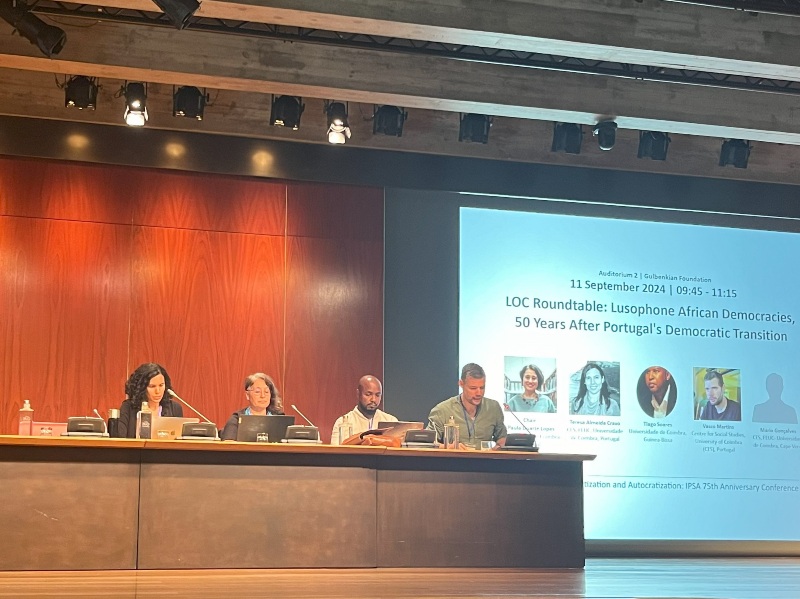
LOC Roundtable - Lusophone African Democracies, 50 Years After Portugal's Democratic Transition
Following the opening remarks, the conference featured the first LOC roundtable on Lusophone African Democracies, 50 years after Portugal's Democratic Transition, chaired by Paula Duarte Lopes (Universidade de Coimbra, CES, FEUC, Portugal). The roundtable examined the democratic developments of Portuguese-speaking Angola, Cape Verde, and Mozambique, fifty years after Portugal’s democratic transition. Despite progress, these Lusophone African nations continue to encounter challenges, including corruption, political instability, and limited institutional capacity. The discussion focused on the impact of post-colonial dynamics, external influences, and social and political national forces on the democratic developments in these countries.
The first speaker Vasco Martins (ICSTE-IUL, Portugal) discussed the political landscape in Angola, highlighting the dominance of an elite and the persistence of autocratic governance, with the People's Movement for the Liberation of Angola (MPLA) party maintaining power since the first elections in 1992. Still, the sheer amount of civil society democratic forces is overwhelming.
Mário Gonçalves (Universidade de Coimbra, CES, FEUC, Portugal) offered a perspective on his home country, Cabo Verde, which, despite being seen as a democratic success, faces underlying challenges such as a two-party system that prioritizes political interests over national progress and with civil society mirroring the parties’ autocratic stance, without much space for a critical approach to national politics.
Teresa Almeida Cravo (Universidade de Coimbra, CES, FEUC, Portugal) focused on Mozambique, where the FRELIMO party has remained in power since independence in 1975, despite a civil war and the introduction of a multi-party system in 1992. The FRELIMO governing style has grown more authoritarian as contestation arises. The conclusion is that democracy needs to be analyzed taking into account practices and perceptions, beyond measurable indicators, to enable a better understanding of democracy’s sustainability.
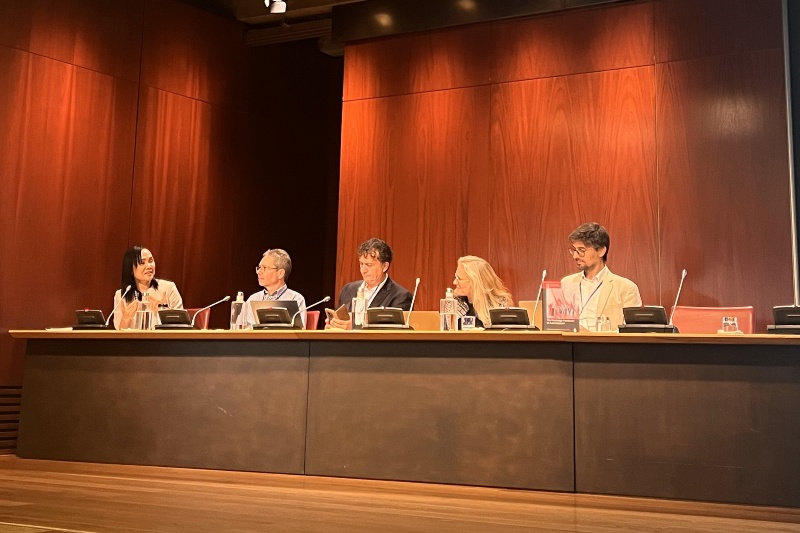
Roundtable - Autocratization Studies in the XXI Century: Taking Stock, Looking Ahead
The second roundtable of the opening day, Autocratization Studies in the XXI Century: Taking Stock, Looking Ahead, was co-chaired by Luca Tomini (Université libre de Bruxelles, Belgium) and Aurel Croissant (University of Heidelberg, Germany), with IPSA President-Elect Yuko Kasuya (Keio University, Japan) serving as discussant. The roundtable focused on the recent scholarship surrounding autocratization, a phenomenon understood as the opposite to democratization, particularly in light of the Handbook of Autocratization published by Routledge in 2024.
Bringing together leading international scholars, the roundtable provided a comprehensive assessment of our current understanding of this phenomenon and highlighted uncharted research avenues in the field of autocratization. The first speaker Murat Somer (Ozyegin University, Türkiye) highlighted the need to develop broader theories on autocratization, suggesting that democratic erosion should be seen as a regime type and managed with context-sensitive strategies.
Andreas Schedler (Central European University, Austria) highlighted the role of early mobilization in countering democratic uncertainty and advocated for a serious approach to this growing trend.
Julia Leininger (German Institute of Development and Sustainability (IDOS), Germany) discussed autocratization in waves, pointing to the role of international factors like economic interdependence in eroding democracy.
Janjira Sombatpoonsiri (Chulalongkorn University, Thailand/GIGA, Germany) focused on the challenges facing civil society activism in the context of sophisticated state repression aided by media actors and data collection.
Finally, IPSA President-Elect Yuko Kasuya drew on her expertise in East and Southeast Asian contexts to contribute to the discussion. She emphasized the importance of focusing more on voters, and encouraging future research from behaviorist scholars to better understand democratic dynamics.
Panels
On the first day, 25 panels addressed a wide range of topics, including the dynamics of democratization and autocratization, electoral manipulation, the rise of authoritarianism, civil-military relations, the impact of populism on democratic backsliding, and the challenges posed by globalization and regional solidarity. Several members of the IPSA Executive Committee (EC) participated in the discussions in various roles, including as chairs, discussants, and paper presenters. IPSA President-Elect Yuko Kasuya chaired the panel Navigating the Crossroads of Democracy and Autocracy in Asia and was also one of the presenters of the Political Polarization and Anti-Democratic Attitudes in Asia paper.
In another panel, IPSA EC member Emilia Palonen served as a discussant for the Populism and Democratic Backsliding session, while IPSA Past President Helen V. Milner presented her paper titled Globalization and the Rise of the Populist Far Right in Europe.
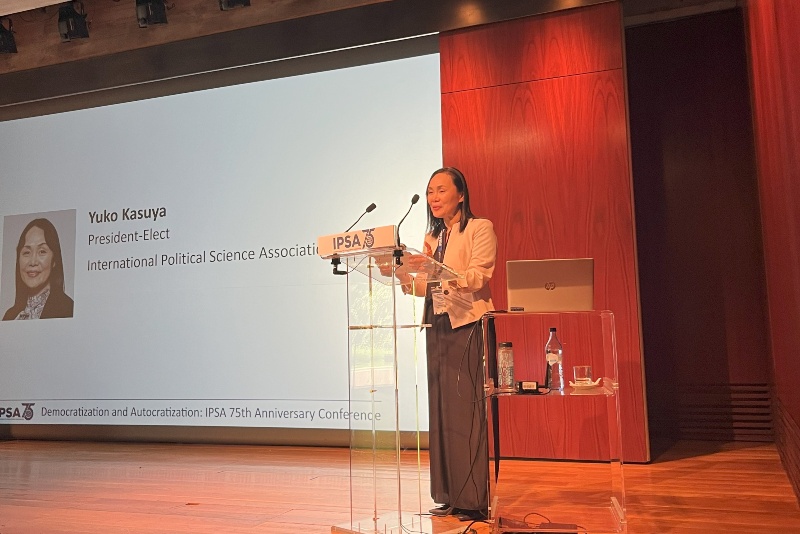
Keynote Address by Adam Przeworski
The highlight of the day was the keynote address by Adam Przeworski, Carroll, and Milton Emeritus Professor of Politics and Economics at New York University. IPSA President-Elect Yuko Kasuya chaired the session and introduced Prof. Przeworski.
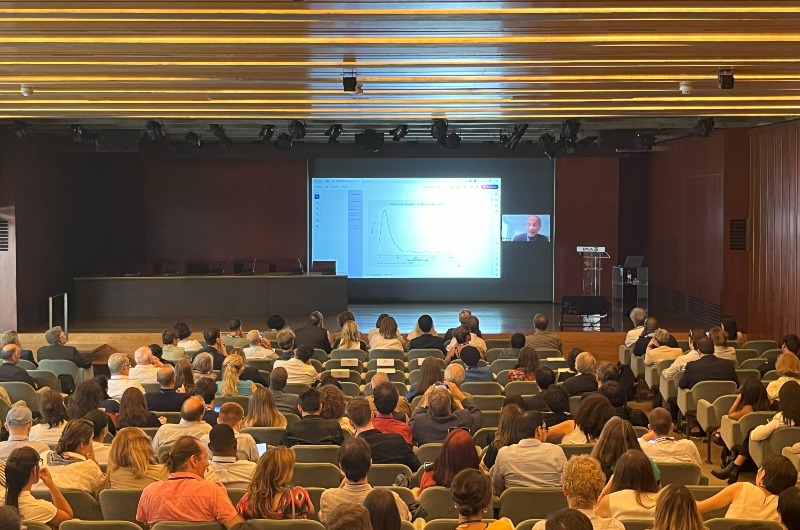 In his keynote address, titled Studying Democracy, Prof. Przeworski reflected on the evolution of democratic thought and explored how our understanding of democracy has evolved in response to real-world challenges, particularly in the post-Cold War era where rival ideologies have faded, but conflicts over values and interests within democracies have intensified. He noted that while many countries have undergone democratic transitions through elections and coups since World War II, 68 countries remain non-democratic. Prof. Przeworski emphasized that democratic stability is at risk when those in power undermine the mechanisms that ensure fair political competition. Unlike the violent democratic breakdowns of the past, such as coups or ideological shifts, today's democratic decline is more subtle. He concluded by emphasizing the need for a unified commitment to the democratic process as the means for resolving conflicts to resist democratic backsliding.
In his keynote address, titled Studying Democracy, Prof. Przeworski reflected on the evolution of democratic thought and explored how our understanding of democracy has evolved in response to real-world challenges, particularly in the post-Cold War era where rival ideologies have faded, but conflicts over values and interests within democracies have intensified. He noted that while many countries have undergone democratic transitions through elections and coups since World War II, 68 countries remain non-democratic. Prof. Przeworski emphasized that democratic stability is at risk when those in power undermine the mechanisms that ensure fair political competition. Unlike the violent democratic breakdowns of the past, such as coups or ideological shifts, today's democratic decline is more subtle. He concluded by emphasizing the need for a unified commitment to the democratic process as the means for resolving conflicts to resist democratic backsliding.











